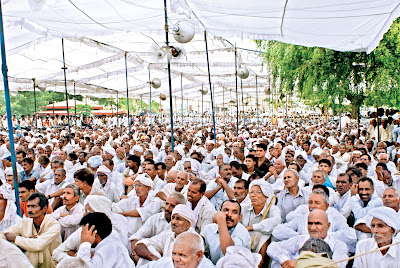Much has been the public outrage across the country in general, and the national capital in particular, after the Delhi bus rape incident. The focus has mostly been on safety of women and the flaws in the system that is supposed to protect them."Law and order exists for the purpose of establishing justice and when they fail in this purpose they become the dangerously structured dams that block the flow of social progress."Martin Luther King
However, little has been said about the rising danger of vigilante justice — which will find many takers as the ‘system’ continues to fail them.
One such example is an incident that took place in Jharkhand
recently when a village meticulously planned and executed the lynching of five
men who were constantly molesting women in the locality. After the murders, a
mob went to the local police station to take responsibility.
While this can be
considered as an isolated incident, one cannot ignore the rising public discontent
when the justice delivery system fails their expectations.
There are tens of thousands of cases every year when people
are forced to suffer heavy-handed measures of the state that is supposed to
protect them from oppressors. Many ‘development’ projects that are launched
with fanfare involve land acquisitions and rarely is this done ensuring
adequate compensation to the landowners.
Since many contracts are ‘won’ by benamis of politicians,
their methods of coaxing the landowners through threat of violence and, of
course, real violence, are invisible to the guardians of law. Considering there is little difference between the
treatment meted out to them by the goons and the police, it is only natural
that organisations such as the Maoists are never short of fresh blood.
While the salaried class is squeezed dry through every
possible tax and surcharges, the corrupt officials and politicians are having a
field day. The rags-to-riches success story of the Indian political class who
turn rupee billionaires after spending barely a decade in modestly-paid public
offices should put financial moghuls to shame.
The Central government cites constraints of international
agreements and refuses to divulge the names of those who have bled the country
white and stashed their illicit wealth abroad.
So, while a clerk caught taking
a Rs 500-bribe loses his job and spends time in jail, those who siphoned off
enough money to feed an entire generation continue to rub shoulders with
national leaders and star as outspoken stalwarts of industry.
Even in cases communal violence, response of the state
machinery has always been late and on many occasions — complicit. The best
example would be 2002 Gujarat riots. While small-fry and thugs have been
convicted, the masterminds of the mass murders — executed with meticulous
planning and clinical precision — remain untouched. When caste kangaroo courts
make a mockery of judiciary and police and continue their reign of unfettered
bloodshed, the victims have nowhere to run.
With all institutional mechanism failing to provide justice
or protect from injustice and oppression, majority of our population (without
the ‘protection’ of a politician or a criminal – now don’t ask me what’s the
difference) has been rendered helpless, hopeless, powerless and cornered.
Great minds have made observations such ‘man is a political
animal’ and ‘man is a social animal’ — basically an animal with many
intellectual facets. And guess what happens when an animal is cornered without
any possibility of escape...
(This article was published as the editorial column in
Postnoon on December 26, 2012.)






.tif)


.tif)


.tif)







